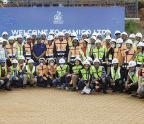O 2
ON A BLEAK Sunday afternoon in late June in Johannesburg, South Africa, Dr Anne Biccard, while on a particularly arduous shift, watched three young people being rushed into the emergency department gasping for oxygen. They had Covid-19, and the hospital, already bursting at the seams with pandemic patients, had no available ventilators.
The immediate solution would have been to plug the new patients to oxygen concentrators, but unfortunately, the hospital could not find an extension cord to plug them into.
“On a Sunday afternoon, where do you think we were going to find one,” Biccard asks. “Silly things like that seem to be like insurmountable challenges.”
The hospital was left with no choice but to try something they had never done before.
“We had to take the equipment from theater – the anesthetic equipment that we use to put patients under and use that to ventilate the patients in the casualty,” Biccard recounts to FORBES AFRICA.
In dealing with the third wave of the pandemic in South Africa, which Biccard says has been worse than the first (July 2020) and second waves (January 2021), hospitals have been overwhelmed and breathless themselves.
Biccard takes a break from the pandemonium in the emergency room to catch her own breath outside as we speak.
“In the first wave, we saw what was happening overseas and were much better prepared… It’s crazy out here! This is my life right now; all of our lives!”
The past few weeks, the Delta Variant, first detected in India in March this year, has catapulted South Africa as the continent’s Covid-19 hotspot, recording a total of over 2.3 million positive cases and 67,000 deaths at the time of going to press.
And with that, the clamour for oxygen for critically-ill patients who develop shortness of breath, one of the hallmark symptoms of Covid-19. India, at the height of the last wave reported the highest daily death toll of any country, and witnessed a severe oxygen shortage and crisis that sent the country into a tizzy looking for oxygen cylinders, ventilators and concentrators, in addition to lifesaving drugs and hospital beds.
“We are running out of oxygen,” the Executive Director of Delhi’s Batra Hospital, Dr Sudhanshu Bankata, told on May 1. “We are surviving on oxygen cylinders, and in the next ten minutes that will run
You’re reading a preview, subscribe to read more.
Start your free 30 days



